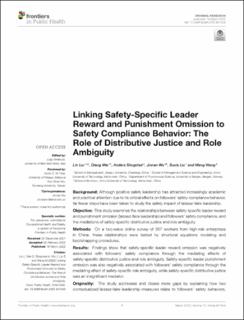Linking Safety-Specific Leader Reward and Punishment Omission to Safety Compliance Behavior: The Role of Distributive Justice and Role Ambiguity
Journal article, Peer reviewed
Published version

Åpne
Permanent lenke
https://hdl.handle.net/11250/3051198Utgivelsesdato
2022-03-16Metadata
Vis full innførselSamlinger
Sammendrag
Background: Although positive safety leadership has attracted increasingly academic and practical attention due to its critical effects on followers' safety compliance behavior, far fewer steps have been taken to study the safety impact of laissez-faire leadership.
Objective: This study examines the relationships between safety-specific leader reward and punishment omission (laissez-faire leadership) and followers' safety compliance, and the mediations of safety-specific distributive justice and role ambiguity.
Methods: On a two-wave online survey of 307 workers from high-risk enterprises in China, these relationships were tested by structural equations modeling and bootstrapping procedures.
Results: Findings show that safety-specific leader reward omission was negatively associated with followers' safety compliance through the mediating effects of safety-specific distributive justice and role ambiguity. Safety-specific leader punishment omission was also negatively associated with followers' safety compliance through the mediating effect of safety-specific role ambiguity, while safety-specific distributive justice was an insignificant mediator.
Originality: The study addresses and closes more gaps by explaining how two contextualized laissez-faire leadership measures relate to followers' safety behaviors, following the contextualization and matching principles between predictors, mediators and criteria, and by revealing two mechanisms behind the detrimental effects of laissez-faire leadership on safety outcomes.
